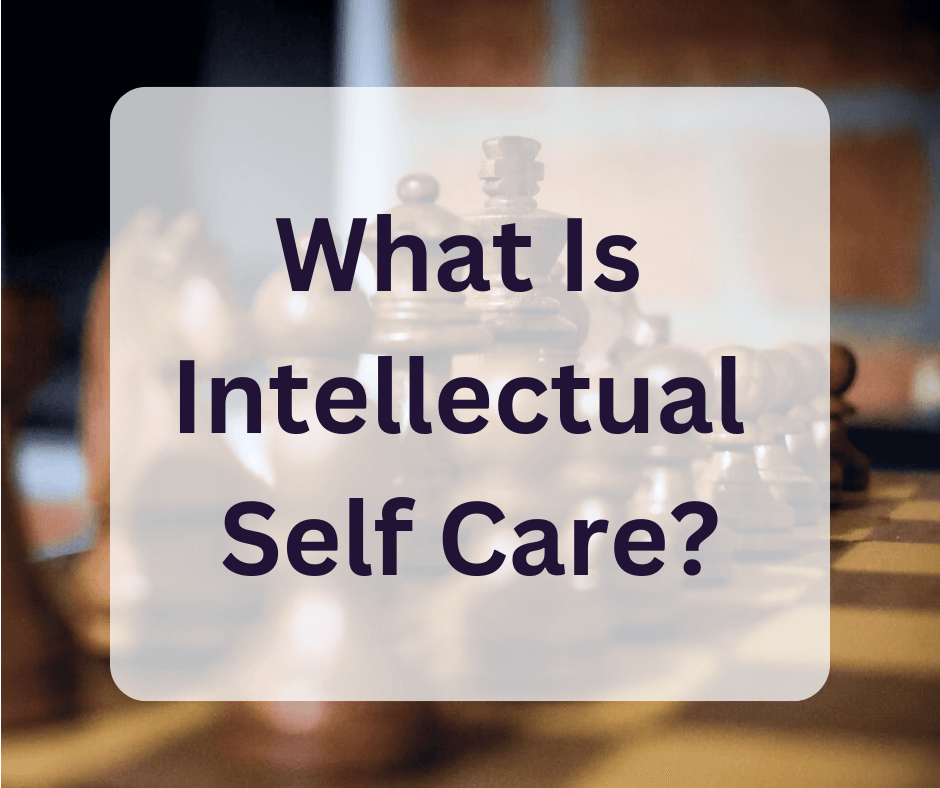Did you know that the average person’s attention span has dropped to just 8.25 seconds – shorter than that of a goldfish? In our hyper-connected world, caring for our cognitive health has never been more crucial.

I’m excited to share how intellectual self care can transform your mental fitness and help you reclaim your focus. Let’s explore this fascinating journey of mental enrichment together!
What Is Intellectual Self Care?
Intellectual self care encompasses deliberate activities and practices that stimulate your mind, enhance cognitive function, and promote mental growth. It’s about treating your brain like the powerful muscle it is – one that needs regular exercise, proper nutrition, and adequate rest to perform at its best.
Why Is Intellectual Self Care Important?
Intellectual self care is just another pillar of mental wellness. You want to be mentally strong to be able to face the challenges that life throws at you. With a clear and strong mind, you are better at problem solving, quicker on your feet, better at controlling your emotions and behaviour. A clear and strong mind will also enable you to engage in productive work.
Let’s dive into the different benefits of intellectual self care an how to achieve them.
Improved Attention Span
Sadly, our attention span is constantly decreasing, as a result of short for content and excessive social media usage. It’s getting harder and harder to focus on linear tasks. We are addicted to the constant stimulation, which is reducing our ability to ignore incoming distractions.
Studies show that heavy social media users become less able to ignore distraction in general, which leads to poorer cognitive performance and shrinks parts of the brain associated with maintaining concentration.

If you feel that this might be your case too, you need to take back your ability to focus and expand your attention span. Learn how to build “attention endurance” through progressive mental training. Remember that it’s a process, and you have to stick to it. You will not see results right away, so don’t be disappointing. Attention is like a muscle that takes time to be trained.
We will explore a few effective techniques to improve your attention span later in the article.
Improved Memory
Another side effect of intellectual self care is having a better memory. Stick to your intellectual self care routine, and you will enhance your ability to remember facts and be more organized in your thinking.
We live in a world that is constantly changing, and learning is part of our everyday life. Our minds need to be agile and retain new information all the time. You need mental fitness to memorize all the information you need for your work, hobbies or any other interests you may have.
Problem Solving
Problem solving is the ability to understand what is happening in your environment, identify obstacles and find solutions to help you meet your needs and achieve your goals. Having problem-solving skills can make a difference when looking for a high-paying job, dealing with change and making decisions.
Focus on your mental fitness to improve your overall performance – not only professionally, but also in your personal life. You will be able to understand and assess risk in a more efficient manner, come up with optimal solutions for your problems, and create opportunities for yourself.

Critical Thinking
In a world that bombards us with misinformation, it is imperative to have critical thinking. Algorithms have taken over our social platforms, but also our sources of information. The lines between useful information and clickbait are more blurred than ever. It’s getting increasingly difficult to be well informed.
Because of this, critical thinking is one of the most important muscles you need if you want to make informed decisions. A strong routine for intellectual self care will help you better at logical reasoning and argument analysis. It will improve your ability to identify cognitive biases and overcome them.
This will lead to mental agility, a better understanding of your environment and better decision-making. A huge step towards building the life you want.
How to Practice Intellectual Self Care
Now that we talked about the benefits of having an intellectual self care routine, let’s focus on what it actually consists of?. What can you do, what actions do you need to take to improve your mental fitness? And, most importantly, how can you integrate these new practices in your current life?
Here are the main practices that you can adopt to improve your intellectual wellness and agility. You don’t have to add all of these exercises to your daily routine. Just find a few that are more feasible for your current situation and routines. Think about replacing old habits that don’t serve you, rather than adding new practices to an already busy schedule.

Brain Training
Mental strength requires training, just like you train a muscle for physical strength. In general, it is a good idea to get out of your way to make your brain work. Don’t be passive, challenge yourself.
- Try to remember phone numbers, shopping lists or useful information that you use every day, instead of relying on your phone to do everything for you.
- Do simple mental calculations, don’t just reach out for your phone. Always think of ways in which you could exercise your mind. You can also incorporate cognitive training exercises and apps in your daily routine. We will discuss them in more detail in the following section.
- Practice mindfulness meditation for improved mental clarity. You can start with 5 minutes a day. Try it before going to bed, in a waiting room, on a bus. There are so many idle moments in a day. Be mindful of them and put them to good use.
Games
Another way to improve your mental wellness and agility is to play games. Yes, video games do count. But it’s best to explore strategy games that enhance decision-making skills.
Try puzzle games that boost pattern recognition abilities, like chess, scrabble, video games, crossword puzzles, Sudoku.
Participate in word games for improved verbal processing. There are countless options in your app store.
However, make sure you don’t stick to the same game for a long time. If the game doesn’t feel challenging for you anymore, it’s time to find a new one. Even mind-strengthening games can become routine.
Learning New Skills
Choose skills that challenge different aspects of your cognition. As we’ve established, routine is the enemy of an agile mind. Look for those experiences that make you feel a little out of your depth.
Learn a new language, take dancing classes, learn to knit or play an instrument. A bonus is that eye-hand coordination. But whatever you choose, make sure it’s something new.
Don’t worry about learning skills that are useful in your professional life. Not everything you do is supposed to be monetized. You are doing it for yourself: because it’s healthy for your brain, and because it’s fun. And who knows? It might help you make new friends.
Relaxation
An aspect we often overlook when it comes to mental strength is relaxation. Working on yourself is great. But it’s just as important to take a break. Do not neglect idle time, it’s just as important as productivity. Actually, it’s vital for productivity and optimal results.

- Take breaks during your workday. A 5 or 10 minute break every hour will work wonders for your concentration. It will help you create space and you will get back to work refreshed and more efficient.
- Take your weekends seriously. Unplug form work on your days off and focus on other aspects of your life. Rest, socialize, work on your hobbies. This distance will actually help you put work into perspective and you will come us with better solutions to you problems.
- Last but not least, practice proper sleep hygiene for optimal cognitive function. There’s a reason why we sleep. If it wasn’t necessary, we would have evolved without it. No doubt you noticed that your reflexes, reaction time and cognitive processes are slower when you don’t sleep enough. Set a fixed bedtime and stick to it.
Limit Your Social Media Usage
We’ve already discussed social media and its unfortunate effects on our mental wellbeing. On top of that, it’s highly addictive. Studies show that the brain scans of heavy social media users look very similar to those addicted to drugs or gambling.

- Establish healthy boundaries with digital consumption. Many social media apps allow you to set limits and they will notify or block you when you reach those limits. If this doesn’t work for you, try uninstalling the app altogether. You will be amazed at the amount of free time you gain when you stop scrolling.
- And while the option of a dumb phone might feel a bit extreme or unrealistic in this day and age, there are tricks to make your phone less appealing, like turning the display to black-and-white instead of full colour.
- Create designated tech-free zones and times. Leave your phone out of the bedroom, or turn it off 2 hours before going to bed.
- Actively create space and engagement in the real world. If you are busy with engaging activities and meaningful connections, you are less likely to reach out for your phone.
Read more on how to create a personalised digital detox routine here:
Conclusion
Your journey toward better intellectual self care starts with small, consistent steps. By implementing these strategies, you’re not just investing in your current mental wellness – you’re building a foundation for lifelong cognitive health.
Remember, every moment spent on intellectual self care is an investment in your future self. Ready to begin? Start with just one technique from this guide today, and watch how it transforms your mental landscape!


Interesting read. I feel my intellect has taken a bit of a toll with excessive social media consumption. I will try out your suggestions. Thank you for sharing 💕